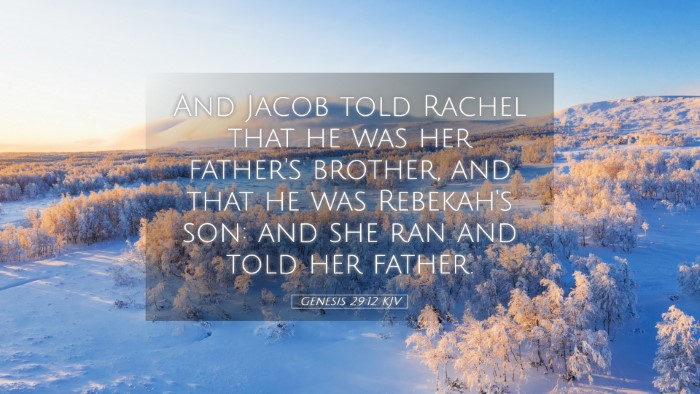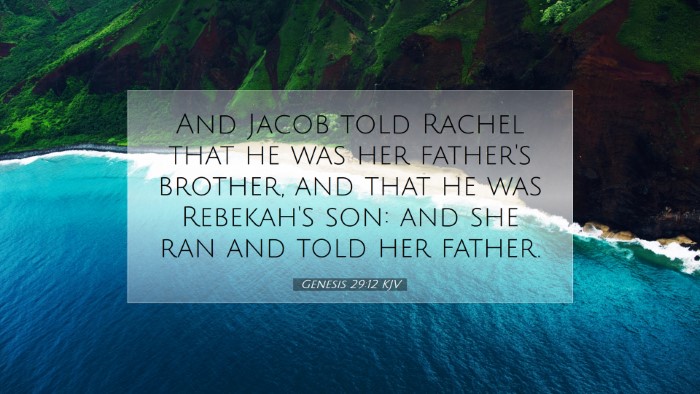Bible Commentary on Genesis 29:12
Genesis 29:12 reads: "And Jacob told Rachel that he was her father's brother, and that he was Rebekah's son: and she ran and told her father."
Introduction
This pivotal moment in the narrative of Jacob introduces key themes such as identity, family relationships, and divine providence. It marks a significant transition in Jacob's life, aligning with the purpose and plan of God. This commentary will explore various insights from esteemed public domain commentaries, offering a blended perspective valuable for pastors, theologians, and students of the Scriptures.
Contextual Background
The events of Genesis 29 unfold after Jacob's flight from his home due to conflict with Esau. Seeking refuge and a wife from his mother's family, Jacob arrives in Haran, where he encounters Rachel, his cousin. This encounter is laden with emotional and theological significance, reflecting the intersection of personal desires and divine purpose.
Verse Analysis
1. Jacob's Identity and Relationship:
Jacob identifies himself to Rachel as her father's brother and the son of Rebekah. This introduction carries deep familial significance and highlights the importance of lineage in biblical narratives. By identifying with Rebekah, Jacob not only establishes familial bonds but also reinforces his connection to God's covenant promises made to Abraham and Isaac.
- Matthew Henry emphasizes Jacob's use of identification as a means to bond with Rachel, hinting at the importance of heritage in God's unfolding plan.
- Albert Barnes notes that this encounter serves as God's directive in leading Jacob to the right family, aligning with the divine promise of multiplying Abraham's seed.
- Adam Clarke further adds that Jacob’s identification emphasizes the relational dynamics that define his journey, marking the beginning of his life's transformative experiences.
2. Rachel's Reaction:
Rachel's immediate response to Jacob’s revelation is significant. She runs to inform her father, Laban, of Jacob's arrival. This action illustrates youthful exuberance and deep familial ties. It reveals her character and the communal nature of their culture. Her enthusiasm can be interpreted as an indication of the importance of kinship and God's provision through familial relationships.
- Matthew Henry comments that Rachel's eagerness to bring news to her father highlights the close-knit family structure and the duties expected of family members.
- Albert Barnes points out that Rachel's reaction signifies the joy of reunion, foreshadowing the unfolding of God’s plan for her and Jacob.
- Adam Clarke interprets this action as an expression of hope and anticipation, being indicative of the broader narrative of God’s providence guiding Jacob’s destiny.
Theological Reflections
This brief encounter conveys profound theological truths prevalent throughout the biblical narrative:
- Divine Providence: The event highlights God's sovereignty in orchestrating circumstances for His chosen individuals. Jacob's journey is marked by divine guidance that reflects God's broader purpose for His people.
- Identity and Heritage: Jacob’s introduction underscores the importance of identity within the family of God. For pastors and theologians, understanding one's spiritual ancestry is central to knowing one’s purpose and mission.
- Interpersonal Relationships: Rachel's actions display the significance of relationships in fulfilling God’s plan. The church is described as the body of Christ; thus, interactions among believers are crucial for nurturing and advancing the kingdom.
Practical Applications
For pastors and church leaders, this passage offers insightful applications:
- Encouraging Family Bonds: Just as Jacob and Rachel's story reminds us of familial ties, church leaders should encourage strong community among their congregants, prioritizing supportive relationships.
- Understanding Heritage: Teach the importance of biblical heritage, helping individuals connect with their spiritual lineage through careful study of Scripture and church history.
- Recognizing God’s Guidance: Pastors must help congregations discern and trust in God’s providential workings in their lives, using Jacob’s story as a testament to the unfolding of His plan through ordinary events.
Conclusion
Genesis 29:12 may appear as a simple introduction between two characters, yet it encapsulates essential themes of identity, heritage, and divine guidance. Through the insights from leaders like Matthew Henry, Albert Barnes, and Adam Clarke, we see how this passage contributes to the broader narrative of God’s covenant community. Such understandings can be compelling for pastors, students, and theologians alike, inspiring them to delve deeper into the Scriptures, recognizing the intricacies of God's plan for humanity revealed through familial and relational dynamics.


